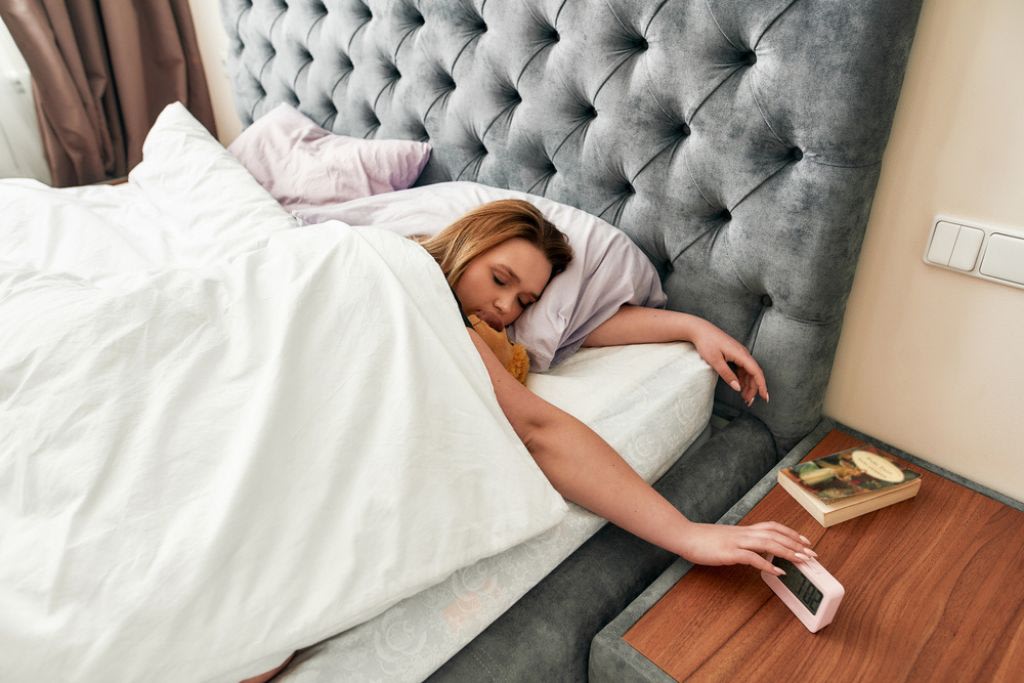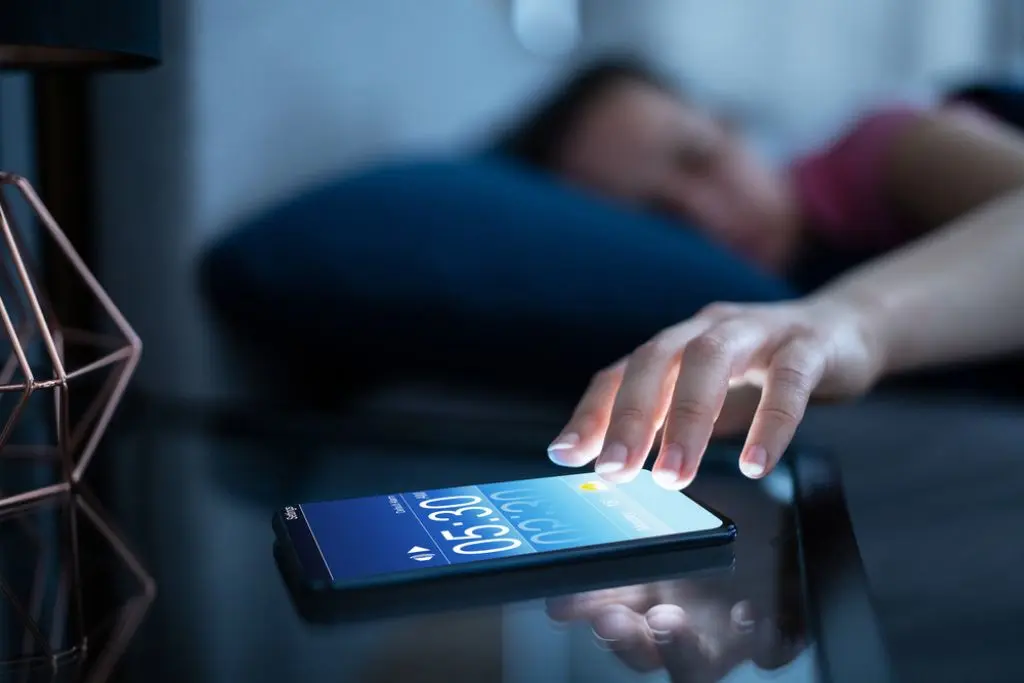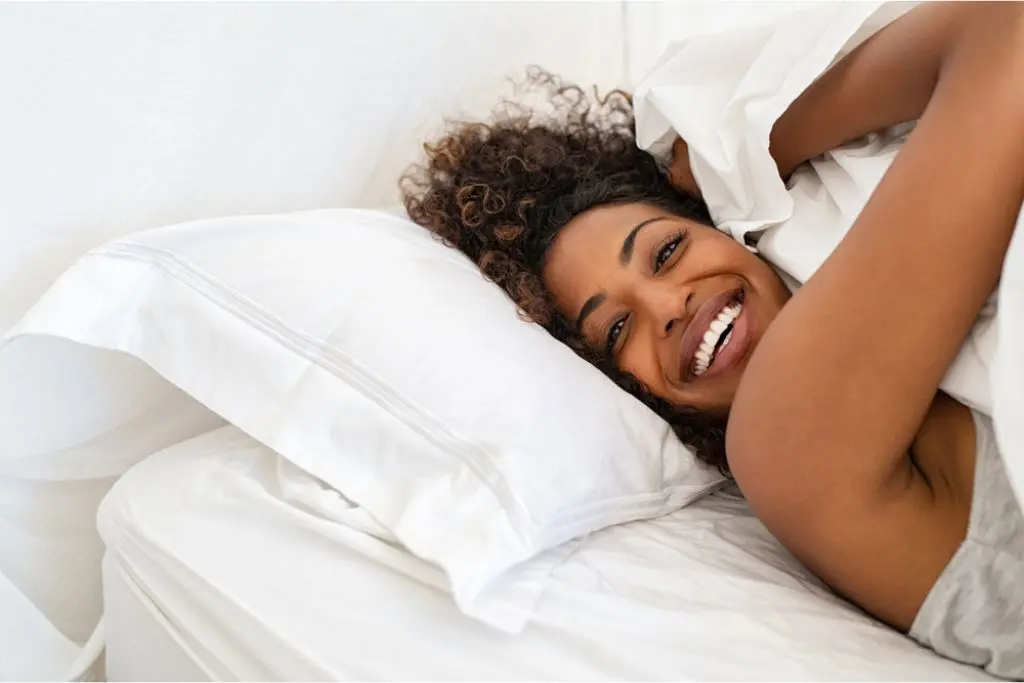Hitting The Snooze Button: What It Does To Your Body

November 2, 2022 - Updated November 2, 2022

Picture this. You’re in a deep sleep, and suddenly a noise jolts you awake. You think to yourself, is that my alarm already?! SURELY it’s not time to get up yet… And before you know it, you’ve reached over, hit snooze, and are trying to squeeze in another glorious 5-10 minutes of sleep. Sound familiar?
If you’re no stranger to the snooze button, it could be time to reassess your sleep schedule and make some adjustments to help improve your energy and headspace. Because those extra 5-10 minutes of shut-eye? They’re not anywhere near as restful as you might think.
What happens to your body when you hit the snooze button?
When you hit snooze and close your eyes again, you’d be right in thinking you’re getting another 5-10 minutes of sleep, but is it the kind of deep restorative sleep you want? Nope, probably not.
According to research published in the National Library of Medicine, the body cycles through five stages of sleep 4-6 times each night, with each stage being a progressively deeper sleep. For those who think a snooze is going to help them feel more rested, it pays to know that each sleep cycle lasts an average of 90 minutes. Last time we checked, the snooze function does not go for that long, so the chances of squeezing in 5-10 minutes of deep, restful sleep in between your alarms is very slim.
People tend to hit snooze because they’re still sleepy and not ready to start the day, but without enough time to get into a deep sleep, the snooze isn’t actually doing your energy levels any favours. Waking from a snooze can also leave you in a state known as sleep inertia - that feeling of drowsiness that can last for hours after you wake and impair your alertness and performance. Maybe there’s some added truth to the phrase, if you snooze, you lose!
Another 2022 study published by the Oxford Sleep Research Society examined snoozing with multiple alarms as a method of waking and found preliminary evidence that snoozing is associated with lighter sleep in the last hour before waking and a higher resting heart rate throughout the night.
Researchers highlighted that in the long term, chronically reduced sleep and increased resting heart rate are associated with several negative health outcomes including diabetes, heart disease, and mortality.

How to ditch the snooze habit
Rise with the first alarm
Instead of setting 10 different alarms or knowing you’re going to hit the snooze button in advance, maximise your deep restorative sleep by setting an alarm that doesn’t allow for any snooze time.
If you find it hard to wake up straight away, try sitting up in bed, opening your blinds or turning on a light. You can even now buy smart lamps that gradually illuminate your bedroom in time for your alarm! Other people find it helpful to have their alarm clock or phone on the other side of the room so they have to get out of bed to turn it off.
Do you tend to hit snooze because you’re not ready or motivated to face the day? To increase those feel-good chemicals in the morning, start your day by noticing the good things in your life. You could try keeping a gratitude journal by your bed and jotting a few things down before you get out of bed.
Get enough sleep
More than a third of Americans aren’t getting the recommended 7-9 hours of sleep, according to the CDC (Centres for Disease Control and Prevention), and for many people, that’s the solution to the endless snooze cycle!
If you know how many hours of sleep you need to feel good and you know when you need to wake up, work backwards from your alarm and get into bed a little earlier to allow yourself time to fall asleep. If eight hours is your sweet spot and you need to get up at 6:30am, that would mean being asleep by 10:30pm, so aim to be in bed before that.
Everyone’s bodies and lifestyles are different, so if you’re not sure how much sleep you need to feel your best, experiment with different bedtimes to see what works for you.
If you’re getting plenty of sleep but are still feeling tired, check out our article on reasons behind that constant fatigue.

Follow a routine
Each day, try to go to bed and wake up about the same time. With time, your body can adopt a new circadian rhythm and prepare you to wake at the right time, as well as helping you to feel tired when you should be heading to bed. Once you’re in a good routine, it’s common to wake up just before your alarm even goes off!
A routine that sets you up for a good night’s sleep could also involve dimming your lights at least 30 minutes before bed to signal to your mind and body that it’s time to go to sleep, putting away your phone and other screens an hour before bed, and avoiding caffeine and alcohol in the second half of the day if you can.
Stay active during the day
That same 2022 study found some common traits and behaviours that increased the likelihood of being a snoozer, one of which was accomplishing fewer daily steps. This may be because aerobic exercise increases the amount of slow-wave deep sleep you get, says John Hopkins Medicine.
Depending on your lifestyle and other activities, somewhere between 6,000 and 10,000 is a great step target.
Minimise sleep disruptions
Another precursor for snoozing found by those researchers? Having a more disturbed sleep! If you’re a light sleeper or your sleep tends to be interrupted, consider some of these ideas:
Wear ear plugs for reduced noise
Have a warm shower or bath before bed
Wear an eye mask or invest in blackout curtains
Put your phone on silent or do not disturb mode
If you sleep in the same bed as your partner (or are sometimes joined by your children or pets!), get a mattress designed so you don’t feel the movement of the other person
For those with busy minds, try a sleep meditation before bed or do a brain dump of anything on your mind
Ready to hack your sleep routine so you can seize the day and feel more energised? Skipping the snooze button could be the answer. Win the morning, win the day!

A more empowered you starts with Sweat, and our editorial team is here to bring you the latest fitness tips, trainer recommendations, wellbeing news, nutritional advice, nourishing recipes and free workouts.
* Disclaimer: This blog post is not intended to replace the advice of a medical professional. The above information should not be used to diagnose, treat, or prevent any disease or medical condition. Please consult your doctor before making any changes to your diet, sleep methods, daily activity, or fitness routine. Sweat assumes no responsibility for any personal injury or damage sustained by any recommendations, opinions, or advice given in this article.
Wellbeing